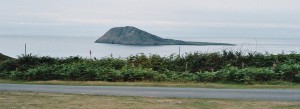I have just spent a glorious few days at Woodbrooke immersed in the poetry of R S Thomas. R S was a clergyman and poet who lived and worked and spent his retirement primarily in North Wales. Born in Cardiff in 1913, his was privately educated in English, but money ran short and he entered the church because that gave him the opportunity of a university education. He did his best as a pastor, though it does not seem to have been his natural calling. He always regretted that he had not learnt Welsh as a child (though it was his mother’s tongue), but learnt as an adult to communicate better with his parishioners. Though he spoke and wrote prose in Welsh, his poetry is written entirely in English. He was a loner, an introvert, a keen bird-watcher and walker. He was a pacifist and campaigned for nuclear disarmament.
Much of the poetry is very bleak, observing the harshness of life in the welsh hills and the loss of the welsh language and culture. But the real attraction for me (and many others) is the poetry where he expresses his searching for God. He grasps the emptiness; the absence that is yet, somehow, also a presence; the tantalising, passing experience that God is there, or was here a moment ago. He glimpses Eternity/Heaven/Paradise and then loses it again. And, depending on our backgrounds, the members of our group said ‘but clearly he was a Quaker/ Buddhist/Sufi/Mystic.’
As an taster, here is one of his poems that really struck me:
But the silence in the mind
is when we live best, within
listening distance of the silence
we call God. This is the deep
calling to deep of the psalm-
writer, the bottomless ocean
we launch the armada of
our thoughts on, never arriving.
It is a presence, then,
whose margins are our margins;
that calls us out over our
own fathoms. What to do
but draw a little nearer to
such ubiquity by remaining still?
And one that gives some context as well as recounting a fleeting, yet eternal, experience:
The Moor
It was like a church to me.
I entered it on soft foot, breath held like a cap in the hand.
It was quiet.
What God was there made himself felt,
Not listened to, in clean colours
That brought a moistening of the eye,
In movement of the wind over grass.
There were no prayers said. But stillness
Of the heart’s passions – that was praise
Enough; and the mind’s cessation
Of its kingdom. I walked on,
Simple and poor, while the air crumbled
And broke on me generously as bread.

